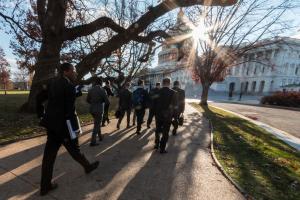Veterans for American Ideals brings Citizen Soldiers to Washington
 By Joe Jenkins
By Joe Jenkins
Last week Veterans for American Ideals hosted (VFAI) its first Leader Convening, bringing together a nonpartisan group of 30 veterans from across the nation in Washington, D.C. In meetings with key decision makers in the White House and Congress, we advocated for our wartime allies, refugees, and those fleeing conflict. We also raised our voices against anti-Muslim bigotry.
This was our mission, and it remains one worth fighting for and one we intend to win. But to understand why veterans are taking on some of the country’s most contentious issues, we look past the “mission” and into the deeper underpinnings of military service.
When General William Tecumseh Sherman bade farewell to his army after the end of the Civil War, he told them that “as in war you have been good soldiers, so in peace you will make good citizens.” Sherman’s idea here is pretty powerful: military service is, in many ways, the greatest extension of citizenship.
But what it means to be a “citizen soldier” is still something that many veterans and veteran service organizations are trying to define. For many veterans, our time spent in the military and at war was more than just service to our nation and our fellow citizens—it was the ultimate buy-in of this idea ephemeral idea that we call America.
As VFAI leader Colonel Steve Miska puts it, citizenship is not a spectator sport. It’s a conscious commitment that every American owes in some way. The American veteran makes that commitment by writing a blank check the country—what VFAI leader Phil Klay calls “an act of faith” that the nation might use our lives well in service to our shared national values. Whether our government has or has not lived up to that is a question of policy and politics, and VFAI leaders were more than willing to lend their perspective to Washington.
What sets Veterans for American ideals apart is what drives us. In an America beset on all sides by threats internal and external, fears both rational and irrational, we’re using our experience gleaned from service to urge America to follow what Lincoln called the “angels of our better nature.”
The issues that VFAI leaders brought to Washington are central to retaining U.S. moral leadership in the world. Failure to keep faith with the Afghans who served alongside U.S. troops will “cost us our moral credibility and hurt U.S. military operations for years to come,” writes VFAI leader Sarah Feinberg. For others, this issue is incredibly personal.
“I’m only alive today because of my interpreter,” says VFAI leader Chase Millsap. Millsap’s interpreter, who he calls “the Captain” (partly out of affection, and partly to protect his identity), saved the former Marine’s life on patrol. For Millsap and other VFAI leaders, Congress’s recent legislation to protect these allies falls woefully short.
While the VFAI leaders spoke passionately and eloquently on behalf of their foreign brothers and sisters in arms, they extended this same defense to refugees in general, the largest and most vulnerable population since World War II. “How better can America show that it practices what it preaches than by reaching out to those young people in refugee camps,” offered VFAI leader Matt Gallagher, author of Youngblood.
At our core, the United States must live up to its ideal as a nation that extends the hand to all, especially the downtrodden. This ideal is written not only on the Statue of Liberty, but in the hearts of the men and women who have served overseas, who have seen the faces of those in greatest need.
To veterans, standing up for refugees not only affirms the moral positions that we proudly adopted when we put on the uniform, it also makes strategic national security sense. The U.S. military rebuilt Europe after World War II, securing a lasting peace. We defeated communism, granting democracy and hope to the free world. In the wake of the wars in Afghanistan and Iraq, what will be the legacy of the next generation of service members?
As veterans, we have seen the incredible power for good that comes when our policies match our values. When Veterans for American Ideals leaders met in Washington last week, we only dared it happen again. And it won’t be the last time.

